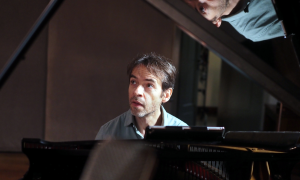Home » Jazz Articles » Interview » Tivon Pennicott: The Tiller
Tivon Pennicott: The Tiller

With roots in St. Elizabeth, Jamaica, Pennicott grew up in a music-brimmed household in Marietta, Georgia. As he says by phone from New York, which he first moved to as both an eager and gifted young musician over ten years ago, "Ska and rocksteady kind of originated from Jamaica and my parents would always go around the house singing with that kind of feel, which is a bit different than the typical American coming from the more rock, hip-hop and gospel-oriented household. So that was in my ear, and I think it shaped part of the direction of how I think about creating music." Alongside his parents and sister, Pennicott started playing the drums at age ten in the family band but gravitated towards the saxophone after getting what he calls the "melody bug," ideas for songs playing in his head while yearning to express himself on the golden horn.
Although he plays within the genre of jazz, the term itself doesn't quite suffice for Pennicott as the name of what he and his fellow artists create. "I have a lot of mixed feelings about just the word, 'jazz' because some of the greats, particularly Miles Davis, didn't necessarily like the word, 'jazz,'" he explains. "It was just used all over to promote the music as a genre so it just kind of stuck that way and we were just kind of like, 'Okay.' Back in the day when it was pop music, it started to pay the bills so it was like, 'Okay, let's just brand it as jazz,' but, to the musicians, the way that we approach the music is as an evolving entity." Perhaps even more significantly, jazz for the ever-inquisitive artist is "freedom, freedom of expression and improvisation" and is a music that is constantly growing.
Beyond music, past discovering a guiding light in such contemporary jazz masters as saxophonist, Joshua Redman and, before him, the essential composer and pianist, Duke Ellington, Pennicott finds great inspiration in the outdoors. As he relates, "I didn't realize it when I was a little younger but I do know now, thinking back, that I've always had this concept of nature." Pennicott's first name, Tivon, he continues, is actually Hebrew for "lover of nature." Whether or not this contentment in the open air compelled him to travel to the warm streets of Florida for college isn't certain but Pennicott honed his saxophone playing in the Sunshine State and drew great attention. So deft on the instrument was he that, as a music student at the University of Miami, revered jazz guitarist, Kenny Burrell, invited him to play with him and he soon thereafter appeared on Burrell's album, Be Yourself (HighNote Records, 2010). Subsequently, the then early-twenties musician served as captivating sideman on the album, Be Good (Motéma, 2012) by celebrated singer/songwriter, Gregory Porter, going on to earn a Grammy before then assisting on the beloved Radio Music Society (Heads Up International, 2012) by bassist/singer, Esperanza Spalding, and achieving another Grammy. Speaking with the gentle-voiced musician, one senses that he was truly grateful for these fruitful collaborations yet was unfazed by any of the flashing lights or glitter of the awards shows that followed. Music itself, the almost euphoric state of live playing, seems to have been foremost on his mind and so he ventured out as the leader of his own band.
Lover of Nature (New Phrase Records, 2014) is Pennicott's auspicious, funk-inflected debut with what he terms his "Sound Quartet" consisting of Mike Battaglia on piano, Spencer Murphy on bass, and Kenneth Salters on drums. Starting with the sprightly "Translated," which features Battaglia's tender key flourishes and Pennicott's sputtering saxophone lines, the album then segues into the florid "Observe" and the fast "Come Get Me," Pennicott's saxophone morphing into a chimera that blows fire at some moments and exhales serenely at others throughout the rest of the record. Discussing his first outing as the man in charge, Pennicott says, "I had been playing with Spencer Murphy at Smalls every Monday, developing a sound during late-night sets, and I felt a strong musical bond with the musicians I was playing with there. I started getting inspired; music kept flowing out, I'd always have tons of ideas and I was inspired by what they were doing. I was just like, 'We feel so good playing together so I think we should record.'" And although Pennicott hadn't crafted a full-length album on his own up to that point and even though it took two years to release the album, he says that Lover of Nature is reflective of his time in New York and represents what he "experienced through life gigging and touring," going onto state that, "Each song was a documentation of experiences in my life." Releasing the album was indeed "exciting and new" for Pennicott, perhaps especially since it was the culmination of playing several shows in New York.
The city is a special place for the artist, particularly the act of playing live here. As he explains, "As musicians, as artists, we're trying to get to that state where we catch a wave. It's like being a surfer; we're just seeing if we can catch one. If we catch one of those waves, we just ride it and, if we catch it and start riding it, that's that autohypnosis where we're just going and basking in the utopia." Pennicott has, in fact, played at lush venues around the world such as London's Royal Albert Hall and the city's own The Village Vanguard and, as he continues, "It's amazing. It's almost like a weird type of high because once you experience it or you start to build up to that state, you're just always trying, trying, trying to get it back. So a lot of times, you'll have shows or performances and you don't quite get there but the audience feels like you did-the audience is happy but you're just like, 'Ah, let's try it again, try it again.' But when you do get there, it's like your fingers are moving by themselves, you're not even thinking, you stop, you look around, and you're like, 'What just happened?'" Such wondrous disbelief, such otherworldliness, is magically realized on Pennicott's Spirit Garden.
Recorded in June 2019 both in New York City and at Dreamland Studios upstate and released this past October, the musician's latest offering is almost a concept album in which he is a tiller of the titular soil who tries to ascend to Heaven. Aided by the chord-less quartet of Philip Dizack on trumpet and chimes, Yasushi Nakamura on double bass, Dominique Sanders on double bass and gong and Joe Saylor on drums and timpani, as well as by close to thirty string musicians, Pennicott soars right from the start; his saxophone swirls and swirls upwards on opening track, "Spring Storm" as he rises towards the hallowed realm. Some of the following songs, such as the drum-stomped "Fermented Grapes" and the searching "Celery Juice," are a bit lighter and more playful yet end with a smattering of strings that both hearkens back to the grand orchestrations of Nat King Cole (an influence on the album) and speaks to the overarching majesty of the record. Alongside Nicholas Britell's spectral score for the film, If Beale Street Could Talk (2018) and Kamasi Washington's sky-splitting opus, Heaven and Earth (Young Turks, 2018), Pennicott's album stands as one of the most fiercely compelling, brightly glowing works in recent memory. Similar even to John Coltrane's singular A Love Supreme (Impulse! Records, 1965), the work is wholly transportive and, consequently, potentially transformative; by listening to the album, hearing how Pennicott marries the profane with the sacred, instilling profundity into the everyday, and marveling at how he meshes the classical with a modern bop (and sometimes hip-hop) sensibility, one will almost certainly come away deeply moved, if not completely changed or redeemed.
Spirit Garden, which Pennicott composed, arranged and produced entirely himself, is, in fact, a record of great vision and intent. It is the result, as he says, of "putting more and more plants, fruits and vegetables" into his diet so that there was "a lot of healing physically but also mentally and spiritually." The acutely intuitive musician then realized, "What a benefit this is. I can't just keep this to myself. Simultaneously, all of these sounds are coming into my head, and it's all rushing into one centered piece of taking the chord-less quartet and putting the sounds of my head on top of it because that is the trigger for healing."
The past year, with its infernal stew of global unrest and the deathly coronavirus, was, after all, like no other in the modern era yet Pennicott wanted to put something positive out into the world. Mentioning album highlight, "Galatians Five Twenty Two," for instance, which is a verse in the New Testament, he explains, "It's what's called the fruit of the spirit. It's kind of the connection between my physical wellness of eating more fruits and vegetables and leaving out a lot of the processed stuff and meat and all that, so it's concentrating on fruit physically but also concentrating on the fruit of the spirit. Galatians Five Twenty Two is love, joy, peace, patience, kindness, goodness, faithfulness, gentleness, and self-control. So those are the fruit of the spirit but it's also me ingesting actual fruit for my wellness." The album does indeed radiate all of those qualities as evidenced on such songs as the bopping "Jump for Joy," which may very well be the sound of love at first glance, as well as on Pennicott's rendition of Dizzy Gillespie's "Con Alma," which is sheer bliss. There is also the late track, "If I May Say So Myself," another highlight that, as its title hints, asserts Pennicott's place as one of the most intriguing, impassioned and visionary jazzmen around.
As winter turns to spring, bare branches blooming with gold leaves and church bells tolling in a wisteria of dutiful sons praying for their diseased mothers, ineffable beauty stands. Young mothers give birth to baby boys on sunlit mornings, strangers strike up a friendship on opposite ends of a park bench, and saxophonists of bottomless compassion shoot a sonic firework into thin air. ..."But the fruit of the spirit is love," starts Galatians Five Twenty Two and that is what remains of us: the room for love, the chance at connection, the glimmer of redemption.
It is a life that can go as quick as a thunder strike, in which a decade ago can feel like yesterday and the other way around, where phone calls go unanswered and others never come, but there is still light. ..."Joy, peace, patience, kindness, goodness...," continues the verse from Galatians and Pennicott, on his radiant album, offers up these slippery qualities. It's a toast, a glass raised to the workers, doers and soul miners but also to those who feel too weak to do at all. It brings everyone in, levels all eyes, compels everybody to ask of each other and of themselves: who are you? What do you stand for? Can you forgive? Can you move forward through this life? ..."Faithfulness, gentleness, and self-control," ends Galatians Five Twenty Two and, halfway through Spirit Garden, on the edenic song of the same name, Pennicott, standing in for everyone, lands in Paradise, blasting his horn, smiling at the brilliant sun before him, finally home.
Tags
PREVIOUS / NEXT
Tivon Pennicott Concerts
Mar
15
Sun
Mar
16
Mon
Support All About Jazz
 All About Jazz has been a pillar of jazz since 1995, championing it as an art form and, more importantly, supporting the musicians who make it. Our enduring commitment has made "AAJ" one of the most culturally important websites of its kind, read by hundreds of thousands of fans, musicians and industry figures every month.
All About Jazz has been a pillar of jazz since 1995, championing it as an art form and, more importantly, supporting the musicians who make it. Our enduring commitment has made "AAJ" one of the most culturally important websites of its kind, read by hundreds of thousands of fans, musicians and industry figures every month.

























